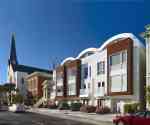Sustainable Design
An integrated approach
Sustainable design is at the core of our practice, and is rooted in the belief that architecture and design matter – that through our work, we can make a difference in the world. It is imperative that this work focus on reducing the roughly 40% of global carbon emissions caused by the building design and construction industry. An integrated sustainable design approach is essential to designing with future generations in mind.
We
collaborate with clients, consultants, manufacturers, specialists and technical
experts to establish and execute a sustainable design strategy tailored to the
needs of a given project. We endeavor to design buildings that improve the
well-being of future occupants and the social and environmental context within
which the building exists. Through our work we strive to reduce both operational and embodied building
sector carbon emissions, increase long and
short-term resiliency, establish indoor-outdoor connectivity, improve occupant
wellness and indoor air quality, and reduce water demand.
Services we provide:
- Certification support (Passive House, LEED, WELL, Energy Star, Enterprise Green Communities, Living Building Challenge)
- High performance building design
- Sustainable master planning and programming
- Feasibility studies
- Daylighting analysis and design strategies
- Resilient design strategies
- Water recycling strategies and support
- Renewable energy strategies and support
- Environmental and climate assessment
- Cost-benefit analysis coordination
- Financial incentive support


We see every project as an opportunity for innovation.
We leverage our experience to continually improve on both the experiential and performance characteristics of our work. This has resulted in projects that have been catalysts for industry change. Some of our most well-known projects involved scaling the Passive House standard to meet the demands of complex, high-rise buildings, such as The House at Cornell Tech, Sendero Verde, and Winthrop Center. Our work also includes projects like the LEED Platinum Sven which features one of the largest blackwater recycling plants in a multi-family residential building in the country, as well as the largest U.S. installation of electrochromic glazing.
Our groundbreaking work has led to a variety of feature articles, including pieces by Architectural Record, The Atlantic, Metropolis, The New York Times, and The Wall Street Journal.

Each project begins with a collaborative goal-setting process to identify environmental performance goals and strategies for success.
Our solutions are data supported through in-house climate, context, system assessments, and building performance modeling. Each project team is supported by in-house Sustainable Design experts who collect data from our portfolio, research new technologies and systems, and create resources to support project teams. Sustainable Design Leads are embedded on project teams to offer continuous support toward meeting the sustainable design goals.


We paved the way for large-scale Passive House.
Our Passive House work began with the path-breaking student residence high-rise, The House at Cornell Tech. Since then, Handel has worked directly with the Passive House Institute to push the boundaries of their performance standards with three large-scale Passive House developments: Harmony Commons, a 746-bed dormitory for the University of Toronto Scarborough that opened in 2023; Sendero Verde, a 709-unit 100% affordable housing development in East Harlem which opened in 2024; and a mixed-use office and residential tower in Boston, Winthrop Center, which opened in in 2023 is now the world’s largest Passive House office building.


We are thought leaders in the sustainable design community.
We believe that the best way to reduce Greenhouse Gas Emissions in the building industry is to make sustainable design easy to understand and inexpensive to build. Our sustainability team has been teaching and lecturing to a variety of building owners, including private developers, non-profits, colleges & universities, and city agencies.
Some recent conversations:
LEED Certification vs. Passive House: Which One is Right For Your Building?
Why Passive House Buildings Create a Healthier Interior Environment









